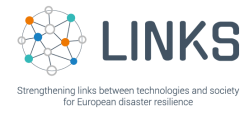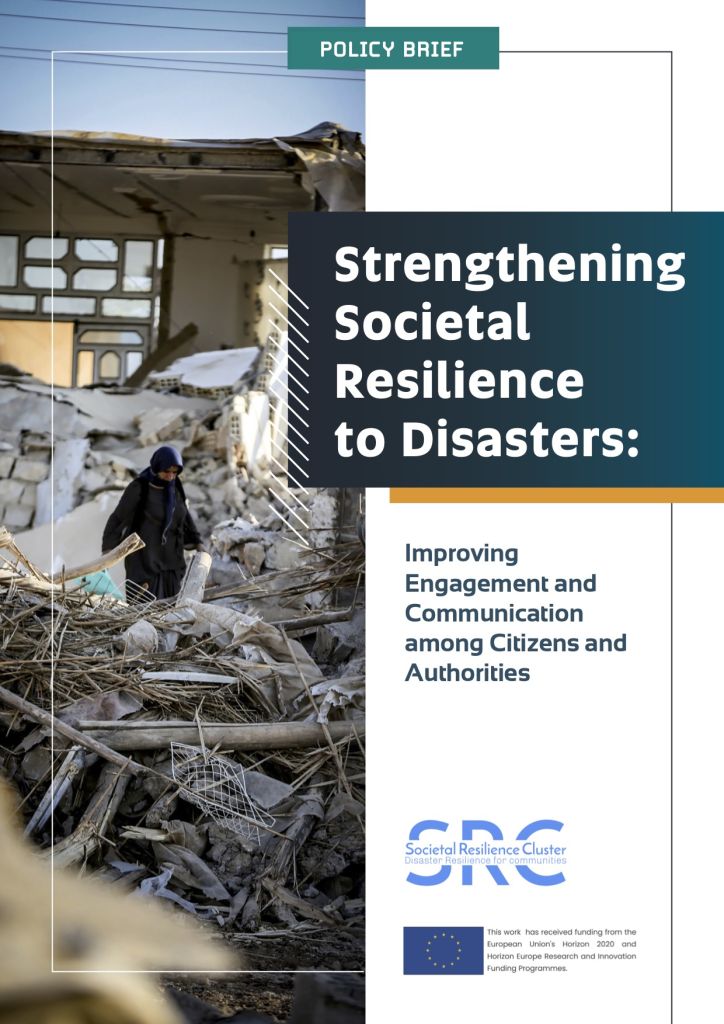Following the successful Disaster Resilient Societies (DRS) CERIS community engagement event held last year in Toulouse, a group of EU funded research projects working on Societal Resilience collaborated to develop a combined policy statement covering emerging issues being highlighted within their respective areas of research and innovation.
The brief aims to provide decision-makers and stakeholders with relevant, evidence-informed policy recommendations on how to increase the level of resilience to disasters in European communities. Specifically the brief focuses on improving engagement and strengthening communication among citizens and authorities involved with Disaster Risk Management (DRM). Strengthening societal resilience to disasters, therefore, requires investment by authorities at operational, strategic, and policy levels to improve engagement with citizens and integrate inclusive communication processes.
Engaging citizens in Disaster Risk Management (DRM) involves developing strategies and methods to better incorporate the contributions of informal actors (e.g. citizens and volunteers) in preparing for risks and responding to the impacts of disasters.
Through the facilitation of the CMINE – The Crisis Management Innovation Network Cluster for Societal Resilience (SRC) – a group of projects addressing societal matters – 9 projects worked together with the support of the Horizon Results Booster Service to produce a summary of key policy issues affecting them all.
Support from DG HOME and the CERIS DRS group has helped to ensure that the document is in a usable format to inform future policy development where appropriate and we’re graetful to the Union Civil Protection Knowledge Network for their support with dissemination.
The document is seen as a clear and powerful demonstration of what can be achieved when like-themed projects come together to share research outcomes, expertise, and thinking. The initiative is hoped to inspire and take-off in other areas of study covered by organised project Clusters.
Looking forward, the intention is to make this a living process for sharing outcomes and to build on it as new projects come onboard, developing themes and ideas addressing identified gaps in the policy landscape.
Following the successful Disaster Resilient Societies (DRS) CERIS community engagement event held last year in Toulouse, a group of EU funded research projects working on Societal Resilience collaborated to develop a combined policy statement covering emerging issues being highlighted within their respective areas of research and innovation.
The brief aims to provide decision-makers and stakeholders with relevant, evidence-informed policy recommendations on how to increase the level of resilience to disasters in European communities. Specifically the brief focuses on improving engagement and strengthening communication among citizens and authorities involved with Disaster Risk Management (DRM). Strengthening societal resilience to disasters, therefore, requires investment by authorities at operational, strategic, and policy levels to improve engagement with citizens and integrate inclusive communication processes.
Engaging citizens in Disaster Risk Management (DRM) involves developing strategies and methods to better incorporate the contributions of informal actors (e.g. citizens and volunteers) in preparing for risks and responding to the impacts of disasters.
Through the facilitation of the CMINE – The Crisis Management Innovation Network Cluster for Societal Resilience (SRC) – a group of projects addressing societal matters – 9 projects worked together with the support of the Horizon Results Booster Service to produce a summary of key policy issues affecting them all.
Support from DG HOME and the CERIS DRS group has helped to ensure that the document is in a usable format to inform future policy development where appropriate and we’re graetful to the Union Civil Protection Knowledge Network for their support with dissemination.
The document is seen as a clear and powerful demonstration of what can be achieved when like-themed projects come together to share research outcomes, expertise, and thinking. The initiative is hoped to inspire and take-off in other areas of study covered by organised project Clusters.
Looking forward, the intention is to make this a living process for sharing outcomes and to build on it as new projects come onboard, developing themes and ideas addressing identified gaps in the policy landscape.


